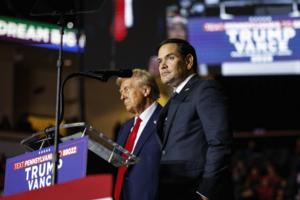Politics
/ArcaMax

Slow vote-counting, flip-flopping leads, careful certification and the weirdness of the Electoral College – people who research elections look at what to expect on election night
As Election Day arrives, people’s feelings of eagerness and anxiety can intensify. It’s normal to want to know the results, but it’s also important to make sure that when the results are announced, they’re accurate.
The Conversation U.S. has covered many aspects of the election, including the mechanics of tallying and ...Read more

Kamala Harris distances herself from Biden's 'garbage' remark amid Puerto Rico controversy
Kamala Harris Wednesday sought to distance herself from President Biden’s controversial remarks that Republicans claim labeled their supporters as “garbage.”
” I strongly disagree with any criticism of people based on who they vote for,” said Harris, adding that she hasn’t talked to Biden about the controversy. “I will be a ...Read more

Hillary Clinton will hold get out the vote events in Tampa on Saturday
TAMPA, Fla. — Hillary Clinton, the former first lady and Democratic presidential nominee, is wading into Florida politics this weekend.
At two Tampa events on Saturday, Clinton will participate in get out the vote rallies, a spokesperson for the Harris-Walz campaign in Florida said.
The campaign did not offer specifics about the timing or ...Read more

New poll in Colorado's 8th District race gives slight -- but not definitive -- edge to one candidate
DENVER — U.S. Rep. Yadira Caraveo has built a slight edge over Republican opponent Gabe Evans in Colorado’s tightest congressional contest less than a week before the Nov. 5 election, according to a poll released Wednesday.
But her lead — less than 2 percentage points — remained well within the survey’s margin of error.
The latest ...Read more

Bill Clinton touts Harris' record on economy, foreign policy at Michigan church
MUSKEGON HEIGHTS, Mich. — Former President Bill Clinton visited a Muskegon Heights church on Wednesday to stump for Vice President Kamala Harris, pitching her as the presidential candidate who will protect democracy, improve the economy for working people and navigate foreign policy challenges.
He acknowledged a chief foreign policy issue ...Read more

RFK Jr. says Trump promised control of several health agencies, campaign demurs
Robert F. Kennedy Jr. has claimed former President Trump has promised to give him control of several agencies overseeing health in a future administration, but a campaign spokesman demurred Wednesday and said nothing has been decided.
The anti-vaccine activist, who ended his independent presidential campaign and endorsed Trump in August, said ...Read more

Trump, Walz to return to Michigan in campaign's final days
DETROIT — Republican presidential nominee Donald Trump will hold his campaign second rally in five weeks on Friday at Macomb Community College in Warren.
Trump's campaign announced the upcoming visit with six days remaining before Tuesday's presidential election, in which voters will decide whether Trump, the former president, or Democratic ...Read more

Rogue Trump statue in Philadelphia commemorates 'a lifetime of sexual assault'
PHILADELPHIA — A large golden-colored statue of former President Donald Trump with his right hand held out in a crude gesture appeared behind the Maja statue at Maja Park on the Benjamin Franklin Parkway Wednesday morning.
While the work was not signed and no artist immediately took credit, a similar statue appeared in Portland, Ore., Sunday ...Read more
‘Each bears his own ghosts’: How the classics speak to these days of fear, anger and presidential candidates stalking the land
“Fear stalks the land, including the Upper West Side,” I wrote to a friend the other day. A week before the election, everyone seems to be afraid.
Not that we’re afraid of the same things. Newspaper owners and corporate leaders fear Donald Trump’s retribution if they endorse Kamala Harris. Election workers fear the mob. ...Read more

Kamala Harris and Donald Trump head to the Southwest Thursday, while Tim Walz makes a return to Pennsylvania
PHILADELPHIA — Vice President Kamala Harris and former President Donald Trump will turn their attention to the Southwest Thursday with campaign events in Nevada and New Mexico, while Minnesota Gov. Tim Walz, Harris’ running mate, returns to Pennsylvania.
Kamala Harris campaign events
Harris is slated to appear Thursday evening at a rally ...Read more

A new president will be elected − but it may take some time to determine who wins
For more than 100 years, media of many kinds tried to be the first to report presidential election results. Although that urge still exists, pundits and analysts are now more concerned with accuracy than speed.
That’s because of the 2020 election. A raging pandemic, a divided country, a close race, polling failures, false ...Read more

Editorial: Rally rhetoric reflects Trump's divisiveness
Opinion editor’s note: Editorials represent the opinions of the Minnesota Star Tribune Editorial Board, which operates independently from the newsroom.
•••
Even amid an increasingly coarse culture, let alone campaign, the words from a series of speakers at the Trump campaign rally on Sunday night at New York’s Madison Square Garden ...Read more

Donald Trump hired him to find voting fraud. He debunked it instead
ATLANTA — Four years ago, Donald Trump insisted that voting fraud cost him the election, and he hired Ken Block to prove it.
A data analyst, Block did his best, searching for dead voters, double-voting and absentee ballot fraud. But he found only about a dozen examples of fraud in Georgia — far short of the 11,780 votes Trump needed to ...Read more

Eureka hospital agrees to provide emergency abortions following lawsuit by state
LOS ANGELES — A Catholic hospital in Eureka has agreed to provide emergency abortion services after a state lawsuit said it had refused to give abortions to pregnant patients in life-threatening emergencies.
The lawsuit alleges that, in February, Providence St. Joseph Hospital denied a patient emergency care when her water prematurely broke ...Read more

Supreme Court OKs Virginia GOP's last-minute bid to purge alleged noncitizens from voter rolls
WASHINGTON — A divided Supreme Court on Wednesday ruled for Virginia Republicans, clearing the way for an election-eve purge of about 1,600 registered voters who were suspected of being noncitizens.
In a 6-3 vote, the court granted an emergency appeal from Virginia's attorney general and set aside rulings by a federal judge who called the ...Read more

In Allentown, Trump compares Biden's 'garbage' comment to Clinton's infamous 'deplorables' gaffe
ALLENTOWN, Pa. — Former President Donald Trump on Tuesday invoked an infamous 2016 moment when Hillary Clinton referred to his supporters as a “basket of deplorables,” saying a comment President Joe Biden made was worse.
Trump, who was speaking to a crowd at a rally in Allentown, learned while onstage that Biden had earlier in the day ...Read more

Trump continues to falsely claim Pennsylvania voters are cheating. Shapiro calls the comments 'more of the same.'
PHILADELPHIA — Former President Donald Trump, who continues to falsely claim he won the 2020 election, is once again spreading untrue statements about the 2024 election in Pennsylvania.
On Truth Social Wednesday morning, Trump falsely claimed “Pennsylvania is cheating, and getting caught,” without making any specific allegations of voter ...Read more

Donald Trump rally in Allentown focuses heavily on immigration in majority Latino city, days after Sunday rally fallout
ALLENTOWN, Pa. — Former President Donald Trump’s rally Tuesday in front of a packed PPL Center in Allentown focused heavily on cracking down on illegal immigration and attacks on Vice President Kamala Harris, signaling his final pitch to voters a week out from Election Day.
Kicking off his speech by asking his audience, “Are you better ...Read more

How a new Trump administration could impact Maryland
BALTIMORE – Securing financial assistance for once-in-a-generation infrastructure projects and cash-strapped state programs is a top priority for Maryland leaders heading into the next presidential administration.
So it may not have been surprising Tuesday when President Joe Biden returned to the Port of Baltimore to highlight his ...Read more

Abortion and marijuana ballot measures may bring out Florida Democrats, but the GOP has 1M more active voters in the Sunshine State
The number of voters registered as Democrats has tumbled in recent years in Florida, effectively removing the Sunshine State as a battleground and placing it firmly in the red column.
At least that’s the dominant narrative found in many media outlets. And it is true that Republican Donald Trump won the state in both 2016 and 2020....Read more
Popular Stories
- Will we know the next president on election night? It's more likely than you might think
- Commentary: Trump is using his racism to regain power. Silence will let him ride bigotry to another term
- Donald Trump appeals to supporters in majority-Latino Allentown as his opponents condemn Puerto Rico remarks
- Trump talks border policy to defuse Puerto Rico uproar; Harris addresses thousands at Jan. 6 site in DC
- Will Pa. voters and reproductive rights decide the election?


























































